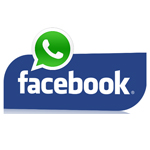 As a way to dominate messaging on phones and the web, on February 19th, 2014, Facebook is purchasing WhatsApp for $16 billion in cash and stock.
As a way to dominate messaging on phones and the web, on February 19th, 2014, Facebook is purchasing WhatsApp for $16 billion in cash and stock.
The deal is being cut for $12 billion in Facebook shares, $4 billion in cash and an additional $3 billion for employee retention. The total of $19 billion price tag marks Facebook's biggest acquisition to date.
WhatsApp that is just 5 years old when acquired, has over 450 million monthly active users and is popular with people that are looking to avoid text messaging charges. With a million users added to its database daily, WhatsApp approaches the SMS volume of the entire telecommunication industry. These has made the company able hold its weight against messaging heavyweights like Twitter, Google and Microsoft's Skype.
"WhatsApp is on a path to connect 1 billion people. The services that reach that milestone are all incredibly valuable," said Mark Zuckerberg, Facebook founder and CEO in a statement. And referring to WhatsApp's massive growth, Zuckerberg said on a conference call, "no one in the history of the world has done anything like that."
Facebook fosters an environment where independent-minded entrepreneurs can build companies, set their own direction and focus on growth while also benefiting from Facebook's expertise, resources and scale. This approach is working well with Instagram after it was acquired (the once said exaggerated $1 billion acquisition is now dwarfed). WhatsApp will also operate in this manner. WhatsApp's brand will be maintained and co-founder and CEO Jan Koum will join Facebook’s Board of Directors. WhatsApp's core messaging product and Facebook's existing Messenger app will continue to operate as standalone applications.
"WhatsApp had every option in the world," Zuckerberg continued in a post to his Facebook page, "so I'm thrilled that they chose to work with us. I'm looking forward to what Facebook and WhatsApp can do together, and to developing great new mobile services that give people even more options for connecting. I've also known Jan for a long time, and I know that we both share the vision of making the world more open and connected. I'm particularly happy that Jan has agreed to join the Facebook board and partner with me to shape Facebook's future as well as WhatsApp's."
Jan Koum said, "WhatsApp's extremely high user engagement and rapid growth are driven by the simple, powerful and instantaneous messaging capabilities we provide." On a post on WhatsApp blog, Koum also said that after the acquisition, WhatsApp will not change.
WhatsApp will remain autonomous and operate independently. Users can continue to enjoy the service for a nominal fee, using WhatsApp no matter where they are and what smartphone they're using. And absolutely no ads interrupting.
"There would have been no partnership between our two companies if we had to compromise on the core principles that will always define our company, our vision and our product," continued Koum.
The note about no advertising is interesting, because that's Facebook's primary method of monetization on its main platform. WhatsApp will also keep its subscription fees, which amount to $1 per user after the first year of use.
Zuckerberg said that he believed WhatsApp was on track to have a billion users, but insisted he had no plans to place advertising on WhatsApp's interface, saying he did not think ads were the best way to make money from messaging systems.
But with the large user base WhatsApp has, monetizing it may prove tempting.
A termination fee is attached to the deal that would cost Facebook $1 billion in cash break-up fee if the deal falls through, and $1 billion in shares if the deal fails to pass regulatory muster.
Aiming for Greater Penetration
Cathy Boyle, a senior analyst at research firm eMarketer, said that WhatsApp is valuable to Facebook for several reasons beyond advertising, including its younger user base and its popularity overseas.
"WhatsApp actually has greater penetration in a lot of international markets than Facebook," Boyle said in an interview.
By acquiring the messaging giant, Facebook is seeking to embrace the other part of the ecosystem that prefers "talking" rather than "sharing". WhatsApp also gives Facebook inroads into international markets and, as importantly, to a younger demographic.
Buying WhatsApp will bolster Facebook's already strong position in the crowded messaging world. Facebook Messenger is second only to WhatsApp in its share of the smartphone market.